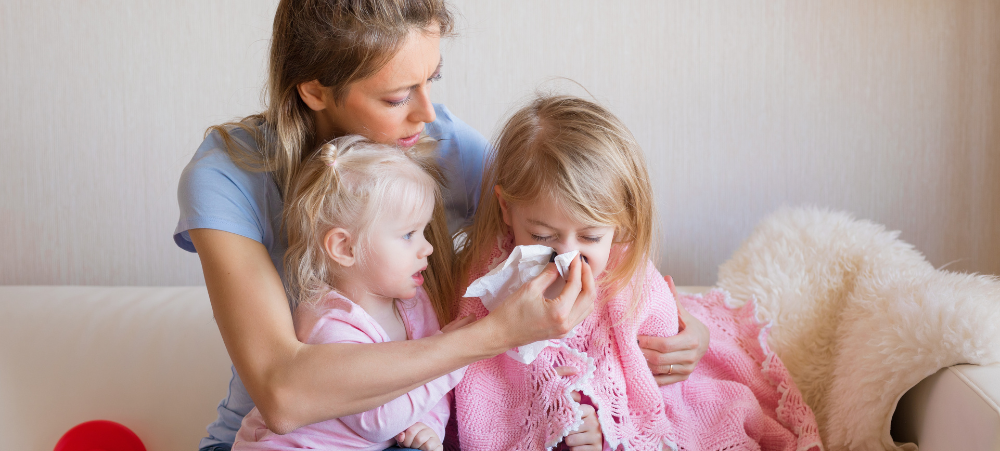Most parents know that during the course of raising a child you will have to deal with different bouts of illness. Here is some information, from Bonitas Medical Fund, which should help you to manage common early childhood illnesses successfully.
Frightening fever
A body temperature above 37.5 degrees Celsius is regarded as fever and the most common cause of a fever is an infection. Fever usually lasts no longer than a few days if treated and can be easily managed at home, after a visit to a doctor. If untreated, it can lead to dangerous complications including pneumonia or convulsions.
Children are vulnerable to bad infections until they are about three months old. If they have a fever they must be taken for a health assessment immediately, as infection can overwhelm a child’s body quickly.
Any child under six years is at risk of developing fits because of a fever. Since a child’s body temperature can rise quickly, suppositories are an effective method to fight fever. If complications occur, such as vomiting and diarrhoea, severe coughing, headache, a skin rash or lethargy, you will need to get medical help immediately
Stressful Colic
Colic, which is characterised by bad tummy pain, usually affects babies just after birth – often making them cry uncontrollably. It usually lasts until the baby is over three months old, but can last longer. If your baby suffers from colic after this age, they may have a reflux disorder.
The symptoms of colic include:
- Crying for no apparent reason
- Changes in posture: Curled-up legs, clenched fists and tensed abdominal muscles are common
- Unpredictable crying episodes (Babies often cry around the same time every day)
- Intense or inconsolable crying which sounds distressed
There are not many treatment options and medical treatment is not usually recommended for colic as a baby usually gets better on their own after a few months. These tips may help:
- Hold your baby during a crying episode
- Prevent your baby from swallowing air by sitting them upright during feeding
- Bath your baby in a warm bath
- Gently massage your baby’s tummy
- Avoid over-stimulating your baby by constantly picking them up and putting them down
- Use a ‘fast flow’ teat if you are bottle-feeding
- Don’t drink too much caffeine if breastfeeding
- Simeticone drops help release bubbles of trapped air in the digestive system, Lactase drops ease lactose digestion or add gripe water to the baby’s bottle.
Uncomfortable teething
Babies are born with their full set of teeth. They are set underneath their gums and will start cutting through between the ages of 4 and 7 months old. By the time children are aged 3, they should have a first or primary set of 20 teeth.
Babies don’t all experience the same symptoms of teething, however, the well-known ones include:
- Drooling
- Chewing on solid objects
- Crying and crankiness
- Irritable
- Inability to sleep
- No appetite
- Sore and tender gums
- Swollen gums
Try rubbing your child’s gums with a damp washcloth, clean finger or a special gum-rubbing finger pad to relieve the pain. Teething rings also help to ease the discomfort. Trying chilling a teething ring in the refrigerator, it creates a soothing coolness along with the pressure on the gums. With time, start to introduce harder foods like cold fruit and vegetables to your baby’s diet as this can also alleviate teething discomfort.
Helpful BabyLine
Babyline is a 24-hour, all year round children’s health advice line, manned by paediatric trained nurses, to assist with child health-related issues. It aims to support parents to ensure their medical aid benefits last longer and to help them maintain and improve the health of their child. The service includes:
- Home care advice
- Clinic/primary care/GP referral for the same day
- Clinic/primary care/GP referral for the following day
- After-hours care within the next six hours
- Immediate referral to the ER
Parents will be given professional advice on what to do next regarding the child’s condition. BablyLine (0860 999 121) is available to members across all the Bonita’s plans, for children under 3 years.
For 2025 we have a renewed Female Health Programme:In collaboration with CareWorks, it’s accessible to all female members aged 18 and above, with an emphasis on preventative care and early detection of female-specific health issues. In addition, we have an enhanced Maternity Programme to support expecting mothers. This includes early identification of and weekly engagement for high-risk pregnancies, post-childbirth care and associated mental health follow-up calls for new mums, given the prevalence of pre and postnatal depression. Also, milestone reminders for children under 3 and cover for antenatal vitamins through savings, day-to-day benefits or the Benefit Booster
Bonitas Medical Fund
0860 002 108
View Website: www.bonitas.co.za
- Putting together your birth plan - December 23, 2025
- Breastfeeding tips - December 15, 2025
- Mental health matters during the festive season: Let’s normalise getting help - December 11, 2025





